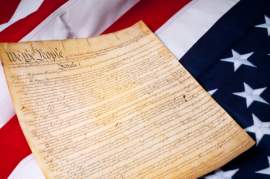
Intolerable Acts

Popular In Constitution
Purpose Of Lifetime Appointment And Pros And Cons Enumerated Powers Bicameral Legislature Background Article 3 Of The Constitution We The People 1st Amendment Who Wrote The Constitution Judicial Review Equal Protection Clause 5th Amendment 10th Amendment Three Fifths Compromise
INTOLERABLE ACT TEXT What are the Intolerable Acts of 1774? The Intolerable Acts of 1774 were a set of punitive measures enforced by the British Parliament in response to colonial belligerence regarding taxation. The outrage over these acts turned popular opinion against the British in the American Colonies and inspired some of the key provisions against the abuse of power in the US Constitution. What was the precursor to the Intolerable Acts? The British government bore the costs of defending the American colonies during the French and Indian War. To recoup the losses sustained by the British government, Parliament passed a number of measures to tax the colonists. These included import taxes by way of the Stamp Act, Sugar Act and the punitive Townshend Acts. The establishment of taxes for pure revenue purposes outraged colonists and quickly led to the Boston Tea Party tax revolt. What acts comprised the Intolerable Acts of 1774? The Boston Port Act was a direct response to the Boston Tea Party and closed Boston Harbor until the value tea destroyed in the protest was returned to the British East India Company. The tea had been destroyed due to anger over arbitrary taxation as the East India Company was excused of taxes to stave off bankruptcy that had the added effect of making the company’s tea cheaper than colonial tea. The closure of the port triggered outrage as it constituted collective punishment for the actions of the protestors. The port was closed without due process and without regard for the residents of Boston. This parliamentary action led to sympathy from other colonies, a precursor to the United States and the First Continental Congress. The Massachusetts Government Act ended free and fair elections in Massachusetts and placed the colonies under the direct control of the British monarch. The executive council, previously elected by the citizens was now appointed by the King and most municipal officers were now appointed by the royal governor. This act also abridged the freedom of assembly for Massachusetts residents by ending town meetings. The Administration of Justice Act was another part of the Intolerable Acts that allowed the royal governor to move other royal officials accused of crimes outside the jurisdiction of that colony to another colony or possibly Great Britain itself. This allowed officials to in effect, escape their crimes by finding a sympathetic jurisdiction. This ability to request a change of venue showed the mistrust of colonial juries and deprived colonial subjects the right to representation granted to other British citizens. The witnesses and accusers had the right to travel to the jurisdiction and recoup travelling expenses, but it was often unfeasible for the colonists to travel great distances. Additionally, the jurisdiction’s court would not have a favorable opinion of his or her testimony. The Quartering Act provided more outrage as it forced colonists to provide food and shelter, at their expense, for members of the British military. This was not the first Quartering act as the British military had tried to coerce the colonies to help pay for their defense during the French and Indian War. Noncompliance had caused the suspension of the legislature and governor of New York until they complied with the quartering order. The quartering of troops, however objectionable was common practice for armies of the time and even the Continental Army quartered troops in private homes. The US Constitution’s distinct prohibition on the quartering of troops is a direct response to this practice. Additionally, the Quebec Act is sometimes counted as part of these acts due to its timing and perceived punishment of the colonists by granted French-Canadian Catholics greater land to the west of the thirteen colonies and greater local autonomy at the detriment of the American colonies. Quebec did not have local representation so this relationship represented a stronger master-subject relationship that made small allowances for local decision. This relationship was a threat to colonial representative democracy as there were fears that the British would attempt a similar model in the colonies, as they had abridged the rights of Massachusetts to representative democracy. This act was also seen a violation of several colonies’ charters which had promised them all the land west of their colony, from “sea to sea.” Legacy of the Intolerable Acts The Intolerable Acts sparked outrage across the thirteen colonies and increased sympathy for the anti-Parliament movement that sought to break from the British crown. The outraged spurred the colonies to cooperate and form a unified body to oppose the Intolerable Acts. The unified body, the Continental Congress, would later become the rebel government and organize the colonial militia against the British Army. Such was the outrage provoked by the Intolerable Acts that direct protections against similar measures are expressly forbidden in the US Constitution. The second amendment for example, provides for a militia in lieu of a standing army for fear of the costs of maintaining such an army would shift to ordinary Americans. The Third Amendment maintains a direct prohibition of quartering troops in private residences. The Third Amendment has been violated once and the federal courts ruled against the state government of New York for this violation. Article Five of the Bill of Rights protects the right of due process for those accused of a crime. This is a legacy over outrage due to the closing of Boston harbor, which deprived those residents of their liberty and rights as British subjects. There are a number of protections that prevent judicial abuse and the rights of the defendant in court. These protections were to protect against actions such as the ones undertaken with the auspices of the Administration of Justice Act that effectively removed the right of the accused and the accuser to a trial of their peers where the crime was committed. Property too, cannot be taken from private citizens without adequate compensation. The severity of the Intolerable Acts decimated support for constitutional monarchy and the British model in the US, leading to greater efforts at a pure, representative democracy that preserves the state’s rights but maintains a unified federal government. Indeed the Intolerable Acts and its overly punitive measures that affected ordinary civilians showed the potential for abuse in a non-representative republic with no meaningful checks on other branches of government. The structure and nature of the US Constitution is a direct reflection of the issues that arose over the Intolerant Acts.



















